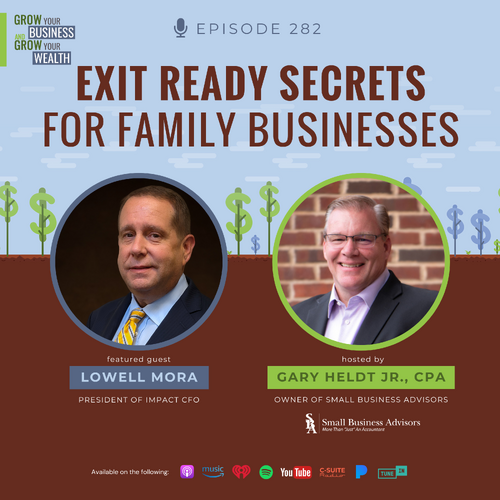Articles
legacy
Who Could Actually Take Over Your Business?
Every owner eventually asks the same question: What happens when I’m not here?
It doesn’t always come from wanting to retire. Sometimes it comes after a long week, a health scare, or just the realization that time moves faster than you thought.
The truth is, most small and family business owners wait too long to figure it out. Then, when the time comes, they have limited options and a lot of pressure.
Let’s talk about what those options actually look like — and how to start planning earl…
What Would Break if You Took Two Months Off?
If you own a small or family-run business, there’s a good chance your fingerprints are on just about everything.
You know every customer, every supplier, every number in QuickBooks. You’ve spent years building this thing — and let’s be honest, it works because you work.
That’s exactly why thinking about stepping back, selling, or even taking a long vacation feels impossible.
It’s not that you don’t want to step away. It’s that you can’t quite imagine what would happen if you did.
But here’s what…
Ask the CFO: The Human Side of Finance: Lessons from Family-Owned Businesses
Reflections from the October Ask the CFO Session
In our October Ask the CFO session, I decided to take a break from the usual financial headlines — tariffs, cost-cutting, and global uncertainty — and focus on something closer to home: the human side of being a CFO in a family-owned or privately held business.
After all, numbers are the easy part. It’s people, relationships, and trust that make the work meaningful — and often, challenging.
The Six Cornerstones of a Great CFO (Fractional or Ful…
What happens if you get hit by a bus tomorrow? "Grow Your Business & Grow Your Wealth" Gary Heldt
I recently joined Gary Heldt on his podcast, Grow Your Business & Grow Your Wealth, and we got into a topic that’s hard for a lot of business owners to face—but absolutely critical if you care about what happens to your business when you’re no longer running it.
Here’s the uncomfortable truth: Almost half of family-owned businesses go bankrupt within two years of the founder’s death.
Not because they weren’t profitable… but because they weren’t prepared.
In this episode, I talk about what I’ve …
Planning to Sell or Step Back? Fix These Transition Risks First
When preparing for a business transition—whether passing it to a family member, selling to an external buyer, or stepping back from daily operations—certain risks can significantly impact the process. Two of the biggest challenges business owners face are customer concentration and management team readiness. These factors can affect business valuation, buyer interest, and long-term stability after the transition. Addressing these early can make the difference between a smooth transition and one …
How Is the Value of Your Business Calculated by the Market?
For business owners thinking about selling, transitioning ownership, or simply strengthening their company’s financial position, understanding business valuation is essential. The market doesn’t just look at revenue—it assesses profitability, risk, industry conditions, and future potential. Knowing what factors drive business value can help owners make smarter decisions to increase their company’s worth.
Key Factors That Determine Business Value
- Financial Performance – Profitability, cash fl…
Getting Ready for the Change: How Long Should You Prepare for a Business Transition?
Succession planning isn’t something that happens overnight. Whether passing the business to a family member, selling to an external buyer, or transitioning to employee ownership, proper preparation takes time—often more than business owners expect. The earlier you start planning, the more control you have over the outcome and the smoother the transition will be.
How Long Does It Take to Prepare for a Transition?
The ideal timeframe for preparing a business transition is 3 to 5 years before the…
Will Your Business Survive the Next Generation? Here’s How to Plan for It
Passing your business to the next generation is a major milestone—one that requires careful planning, strategy, and open communication. While the idea of keeping a business in the family is appealing, the reality is that many family-owned businesses don’t survive the transition. In fact, only 1 in 3 make it from the first to the second generation, and just 1 in 8make it to the third.
As a CFO with over 30 years of experience, I specialize in helping business owners navigate these transitions—av…
Debt as a Tool for Succession Planning: Financing a Smooth Ownership Transition
Succession planning is a critical step for any business, especially family-owned and privately held companies. Whether you're passing the business to the next generation, selling to an external buyer, or transitioning to employee ownership, having a solid financial strategy is essential. One powerful but often overlooked tool in succession planning is debt financing. When used strategically, debt can facilitate a smooth transition, ensuring business continuity and long-term success.
How D…
Categories
- News (1)
- family owned business (57)
- small business (37)
- small business, (7)
- financials (10)
- ebitda (2)
- it solutions (1)
- rpa (8)
- podcast (3)
- succession (11)
- legacy (12)
- debt (4)
- cash flow (7)
- budget (6)
- forecasting (5)
- askthecfo (17)
- succession (4)
- legacy (1)
- legacy (2)
- succession planning (4)
- business value (2)
- 13 week ca (1)
- operations (4)
- inventory (1)
- operations (4)
- supply chain (2)
- manufacturing (1)
- tariffs (6)
- pricing (3)
- customer (1)
- customer concentration (6)
- mexico (1)
- near-shoring (1)
- marketing (1)
- business development (2)
- lean (1)
- leadership (2)
- insurance (1)
- risk (1)
- planning (1)
- real estate (1)
- hr (1)
- loans (1)
- private equity (3)
- selling (2)









